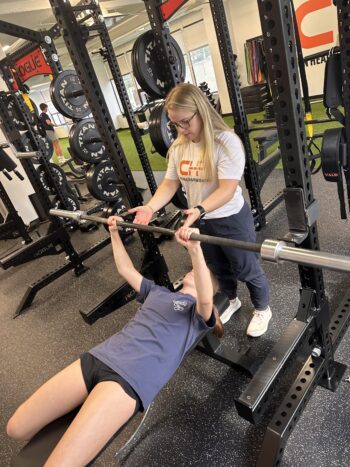The bench press is one of the most popular exercises in the gym. Walk into almost any weight room on a Monday and you’ll see athletes and adults alike lining up to get their reps in. But as common as the bench press is, it’s also one of the leading causes of shoulder pain in athletes and active adults.
At Cohen Health and Performance, we see this all the time in our sports physical therapy practice. Athletes love the bench, but their shoulders don’t always agree. The reason comes down to how the exercise locks the shoulder blades against the bench, reducing natural movement and placing extra stress on the front of the shoulder joint. Over time, this stress can lead to irritation, nagging pain, and even more serious injuries.
Why the Bench Press Can Cause Shoulder Pain
Unlike push-ups, where the shoulder blades are free to move, the bench press pins them down. That restriction limits mobility through the shoulder complex, forcing certain joints and tissues to pick up the slack. For many athletes, that means increased stress on the AC joint or the front of the shoulder. The result? Pain and frustration that keep you from training the way you want.
Sports Physical Therapy Solutions for the Bench Press
The good news is that with a few simple changes, you can still bench press effectively while protecting your shoulders. Here are the modifications we often recommend in sports physical therapy settings:
- Narrow Your Grip
A slightly closer grip can take pressure off the AC joint and reduce pain. - Slow Down the Tempo
Adding a pause at the chest helps eliminate the painful “bounce” effect many lifters experience. - Limit Range of Motion
Using a chest pad or switching to a floor press reduces how far you lower the bar, which in turn decreases stress on the shoulders. - Switch Implements
Dumbbells usually allow for a more natural arm path and are often better tolerated than a barbell. - Adjust Angles
Keep your arms closer to a 45-degree angle instead of flaring them out wide, and vary bench positions (incline/decline) to spread out the stress.
When Modifications Aren’t Enough
Sometimes these adjustments aren’t enough. If you have limited shoulder mobility or strength deficits in key stabilizing muscles, the bench press will still feel uncomfortable. That’s where a physical therapist near you plays a critical role. A sports physical therapist can assess movement restrictions, identify weak links, and design a personalized plan to restore pain-free strength.
At Cohen Health and Performance, our team of Doctors of Physical Therapy specializes in helping athletes and active adults get back to training without pain. Whether it’s the bench press, squats, or sport-specific training, our goal is to keep you doing what you love, safely and at your best.
If you love the gym but shoulder pain is holding you back, don’t just push through it. Small changes can make a big difference—and if you need deeper solutions, a physical therapist near you can get you back to pressing stronger, healthier, and pain-free.
